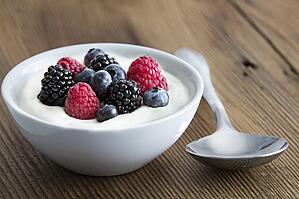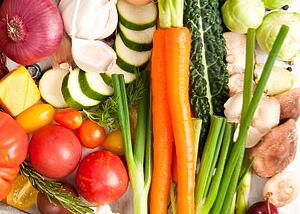6 Simple Snack Ideas and Healthy Foods for Older Adults
Ashley Graven, RD, LD, CPT | Nov 7, 2016

Hello! My name is Ashley Graven, and I’m very excited to be a Guest Blogger for Walker Methodist! I am a Registered Dietitian and Certified Personal Trainer. I graduated from the College of Saint Benedict in May 2013, and have been working at Life Time Fitness since January 2014. Over the next year, you’ll occasionally find blogs from me discussing health and fitness topics. Enjoy!
A snack is a smaller portion of food that is generally eaten between meals. Many of the snack items found at the grocery store nowadays are foods higher in carbohydrates, highly processed, do not satisfy cravings, or do not help promote healthy metabolism as we age. Below, I'll share some healthy foods for older adults that are also easy, convenient snacks.
As a Registered Dietitian, I oftentimes hear the question, “Is it better to eat small meals and snack throughout the day or just eat three main meals?” The answer to this question is different for each person; however, what one chooses to snack on can make a huge difference in their overall health. Finding healthy and simple snack ideas can oftentimes be the most difficult part of choosing a snack – that’s where I can help! Below I’ve outlined six healthy, simple, and yummy snack ideas…
1. Nuts and Seeds
Nuts and seeds are a great snack because they are easily portable, nutritious, and quite satisfying. There are various types of nuts and seeds including almonds, walnuts, cashews, pistachios, peanuts, sunflower seeds, and pumpkin seeds. While all of these seeds have different benefits, one similar characteristic is that nuts and seeds are generally higher in healthy fats and protein, which promote a healthy metabolism and an increase in cognitive function. Make sure to keep your portion size down to about 12-16 nuts, as they are higher in calories.
2. Greek Yogurt with Fresh Berries

Greek yogurt with berries can be a simple, healthy snack option if you choose the right type of yogurt. Full-fat plain Greek yogurt contains higher protein with lower sugar content. Many people choose to eat reduced-fat or “lite” yogurt; however, it is a better option to choose full-fat due to its benefit of increasing satiety, or fullness. Opting for the reduced-fat version will not be the best option because when manufacturers remove fat out of a product, they generally replace it with added sugar and sodium.
Pairing fresh or frozen berries with yogurt gives higher nutrition content because berries have the lowest amount of sugar and highest amount of antioxidants, compared to other fruits.
3. Celery with Nut Butters
Celery can oftentimes be seen as a forgotten vegetable; however, its numerous health benefits and healing effects make for a healthy, simple snack. Celery is a low-calorie snack that is high in vitamin C, vitamin K, and contains flavonoids that help fight cancer. Pairing celery with a "healthy fat," such as nut butter, natural peanut butter, almond butter, or sunflower butter, helps to make a more balanced snack.
When choosing nut butters, be sure to look at the ingredients list and look for a small list containing only nuts and salt. Many shelf-stable nut butters contain additives and preservatives, as well as trans fats. A good rule of thumb is to choose nut butters that require refrigeration to avoid the unhealthy additives.
4. Vegetables with Hummus
 Vegetables are always a great go-to snack option due to their continuous health benefits and high amounts of vitamins. Incorporating a variety of colors of vegetables is important because each color contains different vitamins and antioxidants. There are many vegetables you can enjoy raw, including snack-size sweet peppers, snap peas, carrots, celery, and broccoli, which make for a simple healthy snack.
Vegetables are always a great go-to snack option due to their continuous health benefits and high amounts of vitamins. Incorporating a variety of colors of vegetables is important because each color contains different vitamins and antioxidants. There are many vegetables you can enjoy raw, including snack-size sweet peppers, snap peas, carrots, celery, and broccoli, which make for a simple healthy snack.
Eating raw vegetables with hummus not only helps to provide more flavor but also increases the protein content of the snack. Pairing a source of protein with vegetables provides a more balanced snack, as well as supporting a healthy metabolism.
5. Hard-Boiled Eggs
Whether you like them boiled, poached, or scrambled, eggs are healthy foods for older adults. They are quick, easy, and healthy snacks, packed with healthy fats, protein, vitamins, and minerals. Scrambled or poached eggs are just as great as hard-boiled eggs; however, hard-boiled are more convenient for on-the-go snacking. Many individuals avoid eating the yolk or yellow portion of the egg, however, the yolk contains the majority of the vitamins and minerals. Yes – egg yolks do contain cholesterol, however, recent research is showing that dietary cholesterol does not have as much of an effect on cholesterol levels in the body.
Having an egg or two once in a while for a quick snack can provide many health benefits, as well as promote the feeling of being satisfied.
6. Protein Smoothie
Smoothies are a healthy snack because of their ability to provide many vitamins and antioxidants in a quick amount of time. There are many different ways to make smoothies, however, it is important to add in protein powder to make a more balanced smoothie. Without the protein added, the smoothie generally contains all carbohydrates. There are numerous types of protein powders, some containing whey or cow’s milk and others being a vegan or non-dairy option. An example of a well-balanced smoothie looks something like this:
- 3-4 ounces of water/almond milk
- 1 cup frozen mixed berries
- 1 cup spinach
- 1 scoop protein powder
- 2 tbsp grounded flax seed
A smoothie will not only provide numerous health benefits, but it will also help fuel your body throughout the day.
Healthy Foods for Older Adults
Healthy snacks throughout the day can help promote healthy glucose levels, an increase in metabolism, and also prevent overeating later in the day. Make sure you are snacking on well-balanced foods that provide health benefits. When in doubt, think about whole foods. The more natural or whole-formed your food choices are, the healthier you will be – and your body will sure thank you.
For more healthy living tips, information, and Walker Methodist insights, sign up for their monthly eNewsletter!
Ashley Graven, RD, CPT
Life Time Fitness
Registered Dietitian/Weight Loss Coach
Certified Personal Trainer

